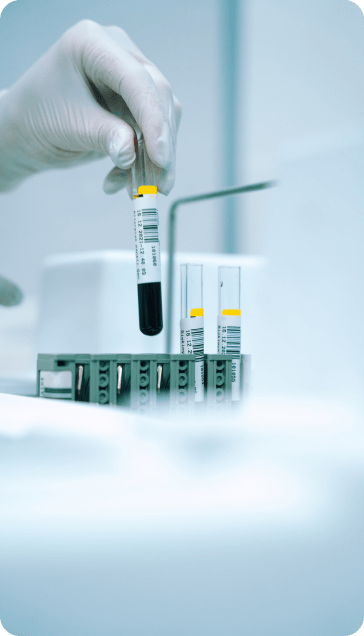
Al Borg Diagnostics
Symptoms of Helicobacter pylori Infection
Do you think you may have a Helicobacter pylori (H.pylori) Infection but are unsure? Are you experiencing various symptoms and wondering what might be causing them? In this article, we will discuss the most common symptoms of Helicobacter pylori and methods of diagnosis.
What are the main symptoms of Helicobacter pylori?
Most people infected with H.pylori do not experience any symptoms or signs. Many individuals have had the bacteria for years without being aware of the Infection.
The exact reason why most individuals don’t develop symptoms is not clear. However, it is believed that some people may be born with more resistance to the harmful effects of H.pylori.
However, H.pylori can often damage the stomach’s inner lining, leading to other conditions such as gastritis, peptic ulcers, or stomach cancer. These health conditions can cause symptoms and signs in individuals. (1)(2)
Here are the common symptoms and signs associated with these health issues:
1. Symptoms of Peptic Ulcers
Approximately 10 – 15% of people infected with H.pylori develop peptic ulcers, which can cause the following symptoms: (1)(2)(3)
- Unexplained weight loss.
- Loss of appetite.
- Mild nausea that may go away with vomiting.
- Frequent burping.
- Upset stomach.
- Mild, persistent stomach pain.
- An ache or burning pain comes and goes over several days or weeks.
- Stomach pain worsens when the stomach is empty, such as in the middle of the night or 2 – 3 hours after eating, and improving after eating or taking antacid medications.
2. Symptoms of Stomach Cancer
While stomach cancer is rare, the risk of developing it increases in individuals infected with H.pylori. The main symptoms of stomach cancer include: (4)
- Poor appetite.
- Feeling full after eating only a small amount of food.
- Unexplained weight loss.
- Stomach pain.
- Fatigue and weakness.
- Abdominal swelling.
- Blood in the stool.
If you suspect you have a Helicobacter pylori infection or any related conditions, it is important to consult a healthcare professional for proper diagnosis and treatment.
How is Helicobacter pylori Infection Diagnosed?
If there is suspicion of a Helicobacter pylori infection, the doctor may recommend the following tests and examinations:
● Breath Test
This test asks the patient to breathe into a bag to measure the amount of carbon dioxide (Co2) in the sample. Then, let him drink a solution containing urea and breathe it into another bag to measure the amount of carbon dioxide in the second sample.
An increase in the amount of carbon dioxide in the second sample compared to the first indicates an infection with H.pylori. (6)
● Stool Tests
Available stool analyses include: (1)
- Stool Antigen Test: This is the most common stool test for detecting H.pylori. It detects antigens (Protein) associated with the H.pylori infection in the stool.
- Stool PCR Test: This test helps detect H.pylori infection and identifies mutations resistant to the antibiotics used for treatment.
● Antibody Test
This test checks for the presence of antibodies (infection-fighting cells) in the blood, confirming infection with H.pylori.(2)
● Upper Endoscopy
During this procedure, a flexible tube with a camera is inserted to examine the upper part of the digestive system. Small tissue samples from the stomach or intestinal lining may be taken to confirm the presence of H.pylori.(6)
When Should You See a Doctor?
Visit a doctor if you experience any symptoms that indicate peptic ulcers, gastritis, or stomach cancer. However, seek medical attention immediately if you experience the following symptoms:
- Severe and intense stomach pain.
- Pale skin color.
- Vomiting that contains blood or looks like coffee grounds.
- Feeling very tired for no reason.
- Trouble breathing.
- Blood in the stool or black-colored stool.
- Dizziness or fainting.
H.pylori-induced ulcers can cause severe bleeding in the stomach and intestines in addition to the symptoms above. This is considered a life-threatening condition. (5)(1)
Therefore, do not hesitate to visit any branch of Al-Borg Diagnostics if you experience the mentioned symptoms of H.pylori. This will allow you to confirm or rule out the Infection through the H. Pylori Package offered by the laboratory, including the breath, antibody, and stool tests.
References:
- https://www.mayoclinic.org/diseases-conditions/h-pylori/symptoms-causes/syc-20356171
- https://www.hopkinsmedicine.org/health/conditions-and-diseases/helicobacter-pylori
- https://www.ucsfhealth.org/medical-tests/helicobacter-pylori-infection
- https://www.healthline.com/health/helicobacter-pylori#cause
- https://www.webmd.com/digestive-disorders/h-pylori-helicobacter-pylori
- https://my.clevelandclinic.org/health/diseases/21463-h-pylori-infection#symptoms-and-causes
Check your health with
H.Pylori Package




